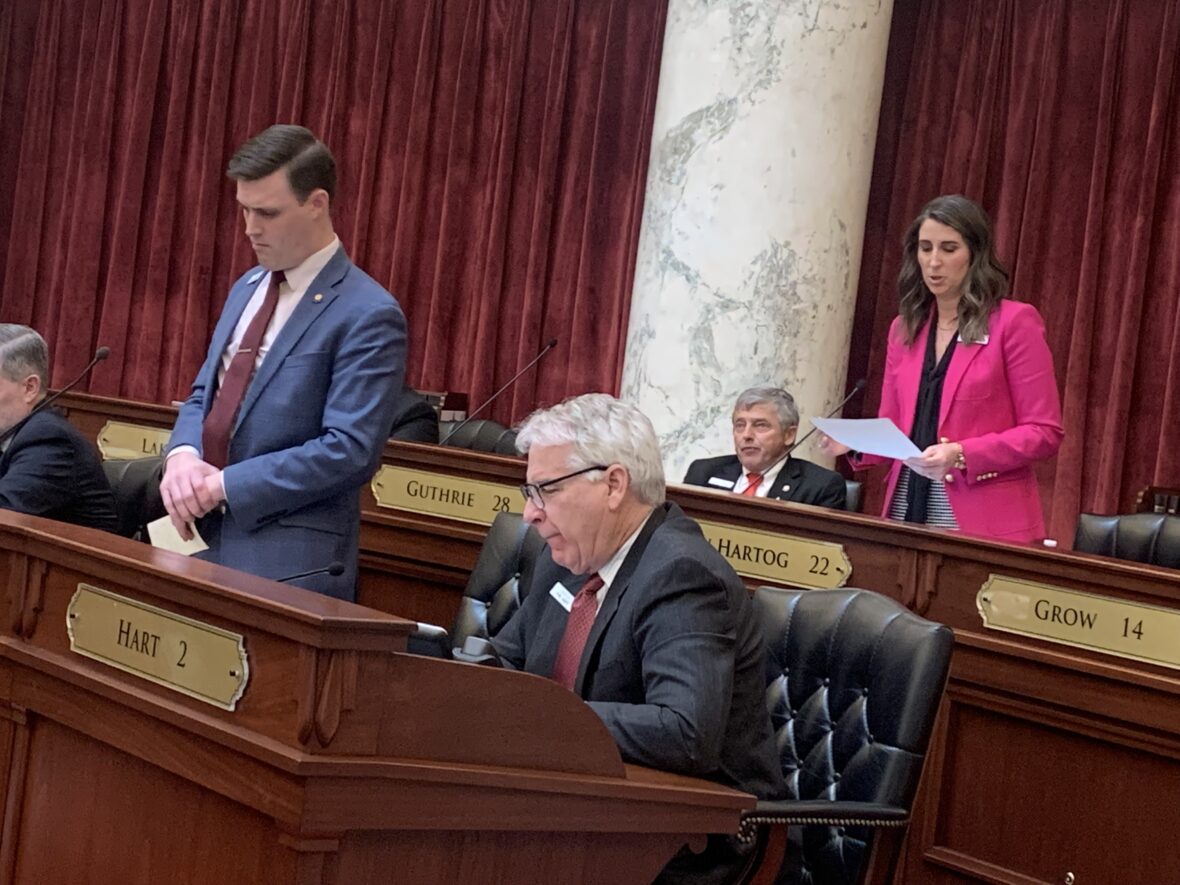
It was an incremental step, and not the final one. But it was a significant moment.
For the first time, a bill that would move public K-12 dollars into private school tuition has passed the Idaho Senate.
Thursday’s 19-15 vote doesn’t mean the private tuition pilot is a done deal. Senate Bill 1161 is now likely to go to a skeptical House Education Committee. And if the bill makes it out of committee and passes the House, it would go to Gov. Brad Little, who can best be described as lukewarm to the idea.
But in a session that has been punctuated by debates over school choice, SB 1161 now appears to be the last bill standing.
Thursday’s debate on SB 1161 concentrated both the mechanics of the bill and the moment in time.
As for the mechanics, SB 1161 piggybacks onto Empowering Parents, Little’s microgrant program designed to help families pay for out-of-pocket education expenses, such as computers and tutors. The bill does what Little proposed in January: it calls for permanent state funding for the microgrants, to the tune of $30 million.
The private school tuition pilot would kick in a year later — capped at $12 million a year, enough to provide 2,000 parents with up to $6,000 for tuition.
And, as Senate co-sponsor Lori Den Hartog pointed out repeatedly, the program will go away entirely in 2029 unless legislators vote to extend it. In other words, the 2029 Legislature will get to decide if the 2023 Legislature got it right.
“This is a true five-year pilot program,” said Den Hartog, R-Meridian.
But opponents took no comfort in the promise of a “true” pilot program.
Sen. Ben Adams, R-Nampa, seemed to take issue with both sides of the same coin. On one side, he said, the hard cap on tuition credits means the state would inevitably pick winners and losers. On the other side, he seemed to suggest that if SB 1161 passes, the tuition credits are here to stay.
“When I hear ‘pilot program,’ I hear, ‘This is the start of something bigger.’”
And Sen. Janie Ward-Engelking again painted the pilot as a bait-and-switch. When lawmakers agreed to fund the Empowering Parents grants in 2022, using federal dollars to do it, she said she was assured that the program wouldn’t be an inroad to a tuition credit plan.
“This bothers me a lot,” said Ward-Engelking, D-Boise. “Now we see the purpose has changed.”
Maybe so, but SB 1161 should not be considered too big a surprise. In 2021, Den Hartog and other lawmakers floated a similar tuition credit idea, and wanted to fuse it onto another federally funded microgrant program, Strong Families, Strong Students. That 2021 proposal stalled out; however, the idea never went away.
Which brings us back to Thursday — and, two years later, the Senate floor debate. Senate Education Committee Chairman Dave Lent seemed to agonize about the moment. He said Idaho is probably heading down the path to publicly funded private school tuition, but he urged senators to wait a year.
“We’re changing direction,” said Lent, R-Idaho Falls. “If this is a good idea now, it will be good, and maybe even better, 10 months from now.”
But on Thursday, the Senate was ready to take an incremental step.
On Feb. 27, this same Senate rejected Senate Bill 1038, a universal education savings account bill. And it wasn’t even close: the bill died on a resounding 12-23 vote.
Eight Republicans who voted against SB 1038 voted for SB 1161 Thursday: Kelly Anthon, Burley; Treg Bernt, Meridian; C. Scott Grow, Eagle; Mark Harris, Soda Springs; Todd Lakey, Nampa; Doug Ricks, Rexburg; Julie VanOrden, Pingree; and Chuck Winder, Boise.
None of these eight senators debated in favor of SB 1161 Thursday. But last week, during an Idaho Press Club question-and-answer session with legislative leaders, Winder again labeled the universal SB 1038 as too much, too soon, with no controls on the floodgates. “Make no mistake, this isn’t a savings account,” said Winder, the Senate’s president pro tem. “It was basically a handout.”
Winder is co-sponsoring SB 1161.
SB 1161 won over Winder, and enough other skeptics to pass the Senate. But if SB 1161 follows its conventional legislative path, it would head to House Education, where a bloc of moderate Republicans and Democrats have aligned against other school choice bills.
On Tuesday, the sharply divided committee voted down House Bill 289, dubbed the Idaho Education Opportunity Program, a $17.5 million education savings accounts proposal co-sponsored by Rep. Lance Clow, R-Twin Falls.
Tuesday’s committee vote doesn’t necessarily mean a deathknell for SB 1161, Den Hartog said after Thursday’s vote. She says HB 289 ran into some of the same criticisms that torpedoed SB 1038: concerns about launching an open-ended program.
“I think this piece of legislation answers at least some of these questions,” Den Hartog said.
Asked about the prospects in House Education, Den Hartog didn’t offer a prediction. “We are working all angles.”
Which is, late in a legislative session, a permanent status.
Roll call
How senators voted Thursday on Senate Bill 1161:
Yes: Kelly Anthon, R-Burley; Treg Bernt, R-Meridian; Carl Bjerke, R-Coeur d’Alene; Cindy Carlson, R-Riggins; Mark Harris, R-Soda Springs; Lori Den Hartog, R-Meridian; Dan Foreman, R-Moscow; C. Scott Grow, R-Eagle; Scott Herndon, R-Sagle; Todd Lakey, R-Nampa; Brian Lenney, R-Nampa; Tammy Nichols, R-Middleton; Doug Okuniewicz, R-Hayden; Doug Ricks, R-Rexburg; Ben Toews, R-Coeur d’Alene; Chris Trakel, R-Caldwell; Julie VanOrden, R-Pingree; Chuck Winder, R-Boise; Glenneda Zuiderveld, R-Twin Falls.
No: Ben Adams, R-Nampa; Van Burtenshaw, R-Terreton; Kevin Cook, R-Idaho Falls; Jim Guthrie, R-McCammon; Linda Wright Hartgen, R-Twin Falls; Rick Just, D-Boise; Abby Lee, R-Fruitland; Dave Lent, R-Idaho Falls; Ali Rabe, D-Boise; James Ruchti, D-Pocatello; Geoff Schroeder, R-Mountain Home; Carrie Semmelroth, D-Boise; Ron Taylor, D-Hailey; Janie Ward-Engelking, D-Boise; Melissa Wintrow, D-Boise.
Absent: Phil Hart, R-Kellogg.
Each week, Kevin Richert writes an analysis on education policy and education politics. Look for it every Thursday.
